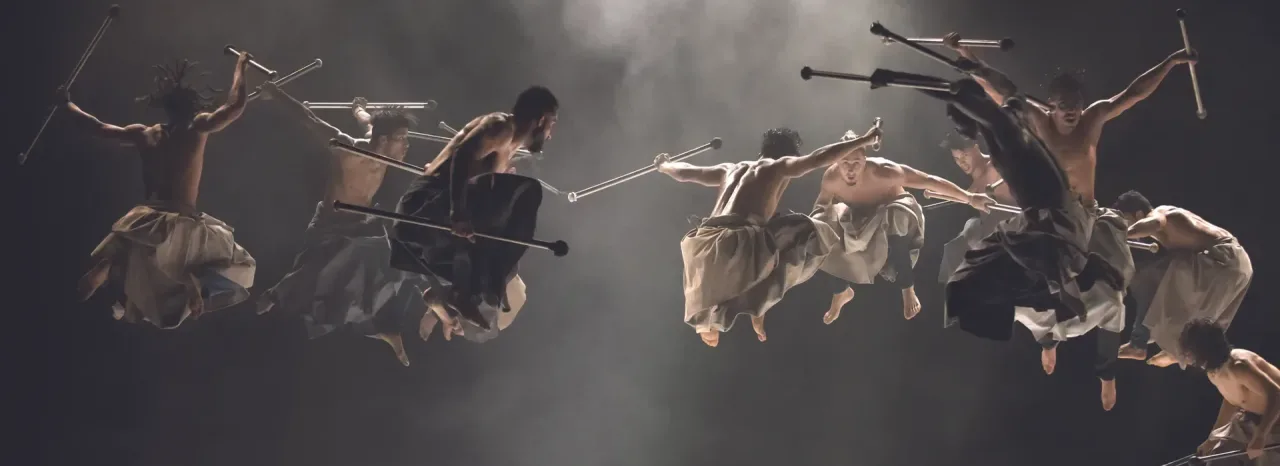This is a story about a path, it's always about a path...
Five years have been lived between France and Algeria, on opposite shores of the Meditarranean, the famous sea that is at the origin of these unrooted people with similar pedigree and fundamental backgrounds entranched in those whom we call Meditarraneans.
As I was vainly attempting to search for reconciliation with the land of my ancestors in Algeria, new ties have instead emerged. Ties that have allowed me to reap a deeper understanding of my own background and roots. I've met fellow artists, witnesses of a lost story. I've met those who I love to call my lost brothers. I've rediscovered the desire to surround myself with others and I've returned with a thirst to create this new adventure.
The barbarous nights or the first dawns of the world takes root from this awe-inspiring and unavoidable story of our Mediterannean basin. I've chosen to share this road which testifies my will to reach out to others, reach out towards the unknown against the mainstream ideas that amalgamate and often dictates how we see "us and them". We, the civilized and them, our neighbors, the Barbarians, where the etymology often takes a pejorative connotation with images of a civilization amiss with any sense of humanity and filled with gratuitous violence often comes to mind.
Naturally, it is important to know where we come from to better understanding where we are heading but it is also important to know where we're talking from and it seems necessary to me in the current context. I think it is necessary for everyone to believe in a universal culture which is at once shared, mixed and linked in order to wish for an inevidably common future.
The barbarous nights or the first dawns of the world will jumpstart a new current at the bottom of the ocean to distance us from obscurantism to better find the light of our common history.
Who were these Barbarians storming in from the North, the mysterious people of the sea that were often described in the Bible, chronicles, and ancient monuments often talk about without really describing who they were or where they came from? Who were these Barbarians of the East, geniuses of the Dark Ages, these Persians, Lonias and Babylonians, the Arabo-Muslims? From what unknown, forgotten, reworked, assimilated or erased History from which we have inherited?
The estranged ones have always been feared. A fear that is fueled by the confrontation of ignorance and frustration itself.
I would then chose to showcase this ancestral fear of the unknown and of strangers to better seek and unmask the beauty, rich knowledge and fine traits behind these so called Barbarians and challenge the well entranched stereotypes from our Western societies.
What I seek is not a rehabilitation of History towards these peoples but to bring a more sensitive light, filled with humanity and try to make these Barbarians loved, these Barbarians who are also our ancestors in some ways.
A form of orientalism definitely nourished my reflextions as well as some thoughts from Ce que le jour doit a la nuit. La Noce Barbare by Jean Cocteau, the weaving of Eastern and Western music, the brilliant traces left by cultures like the Persians, Goths, Vandals, Arabo-Muslim have all nourished and helped inspire The barbarous nights or the first dawns of the world.
I've chosen to bring my glare towards what I feel is the most beautiful; the mixture of cultures and religions throughout the Times to allow and help me draw the foundations of a common geography on which we today stand, all too often without knowing.
I also want to seaze History, open my eyes and slide towards freedom while remembering that the word Barbarian is also said as Amazigh which signifies, the Free Man.
To beauty! The one who, above wars, speaks of unity, the one who gathers all, the one who turns it's back to identity claims, the one who takes the best of everyone and whom, throughout it's history, honors man as its anthem.
To the Mediterannean that contains so much luminosity that it blinds like a lost secret. The secret of our common lost desire and destiny.
To our common origins that has been weaved throughout times throughout the Mediterranean whether Spanish, Italian, Provencale, Oriental, Occidental, Italian, Maghrebi, Romain, Greek...
To our History which has, for over 3000 years, witnessed countless cultures whose differences have brought us together. Indeed, it has brought us together instead of keeping us apart! Whether we're Algerian, Spanish, French.. We're first and foremost Mediterannean and this feeling of belonging is much more anciant than the concept of nations.
